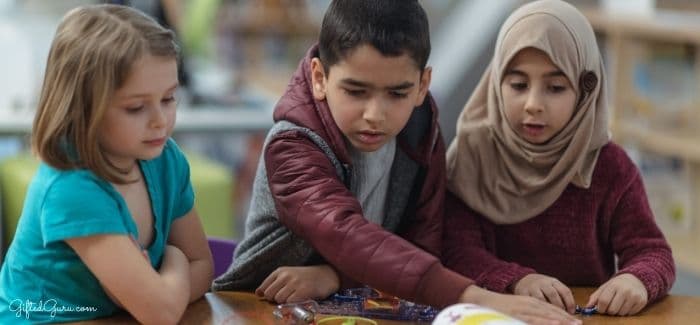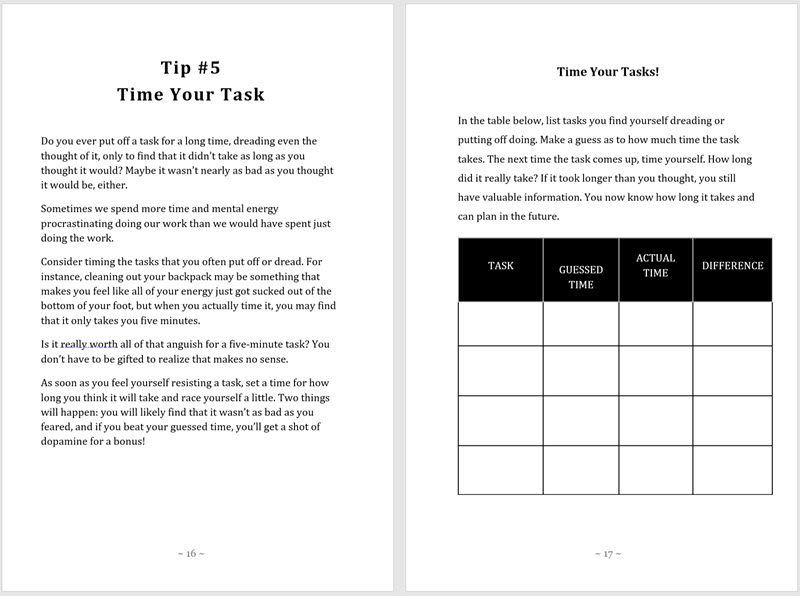When you’re new to the world of gifted children, it can be daunting. Whether you’ve just found out your child is gifted, you’ve just been made a teacher of the gifted, or you are a gifted student who is just accepting that you are in a slightly different world than you expected, you may be seeking advice from people who have been there.
After sharing my best advice to parents, teachers, gifted students (and even politicians), I solicited advice from other teachers and parents.
Here’s what they said. I identified them just by initials to protect their privacy. Some of it brought me to tears. I hope you find meaning in it, too. Thank you to those willing to share.
Advice for Gifted Youth

The best advice I give my GT students is to know their needs and speak up for themselves. We practice this in class.
~ C.N.
And for the children (gifted or not) everyone has strengths and weaknesses and that is okay.
~ D.B.
Your brain is a wonderful, fabulous thing. And while I have no doubt that that big brain of yours will take you far, developing compassion and having empathy for others combined with that big brain will take you even farther.
Challenge yourself. Don’t be afraid to fail. The saying in my classroom is if it doesn’t challenge you, it doesn’t change you! Don’t compare yourself to others- the only person you are competing with it YOU.
The sky’s the limit, so don’t just settle for the mountaintop. Challenge yourself to fly, to soar… knowing that you’re going to crash before you master flying. That’s ok. In fact, that’s awesome. You can’t fail if you don’t try! So try. Challenge. Explore. Then soar.
There is no letter grade, no test score that can accurately measure the most important things in life. Standardized tests don’t assess your creativity, your ingenuity, your determination, your perseverance. You have every right to be proud of your academic achievements, but those scores don’t define you. Don’t let them.
~ T.H.
Two things I try to convey to my 7th and 8th graders every year:
- You’ll never regret doing your best.
2. Become the most educated ______________ you can be. (person, ditch-digger, CEO, office worker, teacher, bus driver…..)
~ P.C.
Find your teacher. Even if they are not your teacher right now. Find that teacher who “gets” you. That teacher who will be on your side. That teacher who will call you out when you need to be called out, but who will do it in private and kindly.
Find that teacher who will have your back when you need it. They are there, waiting for you to ask. Once you find him/her, know that you have found a supporter for life, not just for 6th grade.
~ M.B.
The best advice I have for my daughter is to be like water. When someone is a stumbling block, move around them. Find the path of least resistance. Gravitate towards people who share your common ground. And of course, just like water, if you persist enough, you can wear someone down.
~ S.V.
It’s not happy people who are thankful; its thankful people who are happy. Showing gratitude is huge in my corner of the world and I try to impart this with my students.
~ J.W.
Advice from Lisa
I had so much advice for Gifted Students that I wrote an entire book about it.

In Living Gifted, I share 52 tips for gifted youth to help them survive and thrive in Giftedland.
In this image, you can see the way the book is laid out. On one side of the page, there is a tip. On the other side of the page, there is some kind of exercise or action to take to apply, explore, or implement the tip.

NOTE: You can hear this tip read aloud here.
Even though it’s not the most popular of my books, it holds a very special place in my heart. I poured out all of what I wish I’d known when I was a gifted kid. It’s a cognitive love letter to the gifted kids of the world.
If you would like a copy, it’s available in paperback on Amazon.
If you would like an ebook (much cheaper), you can get it here. Use the code “reader” to make the price just $3.95!
I also recommend that you read the Interview with a Gifted Kid series.
Advice for Parents of Gifted Children

Grades are not important. They aren’t. They are arbitrary ways of measuring information that, in all reality, your child has often already mastered OR- and here’s a big one- they may not even need. Y
our child may be gifted, but believe me when I say that the highest honor is not achieving straight As. Because for gifted kids, achieving straight As is often effortless and means nothing. It means they can play the game. It doesn’t mean they have mastered the subject, and it doesn’t mean that meaningful learning has occurred.
Conversely, a low grade does not mean that they fail to grasp the subject, or that they are incapable of doing so. Often it means they lack organization, or study skills, or time management. Those ARE skills that they will need throughout life, so if that is the case work with them to develop those skills. NOT so that they can get the A, but so that they can learn the necessary executive functioning skills.
Encourage your child to look beyond the letter grade. This is truly freeing. For one, it gives them a chance to fail, which means that they have tried something new. Secondly, it encourages them to measure themselves not in relation to a predetermined level of achievement but rather in relation to their own abilities… did they really push themselves, or did they simply do what was necessary to get the A?
So often our gifted kids are so afraid to fail that they actually fail to push themselves. Don’t let settling, even if it’s settling for an easy A, be an option. Failure to try is the only true failure!
That means that we as parents have to look beyond the letter grade, too. This can be hard, especially because we are used to our children being at the top of the totem pole. But when our children miss an assignment, or fail to study, or actually come across content that they don’t immediately understand for the first time, it’s ok to let them bear the consequences.
Don’t rush to “save” them, particularly at a younger age. Remember, elementary and middle school report cards aren’t part of the college or job application process. Let your children learn from their mistakes and help them to develop the tools to avoid repeating them- that will go farther then blaming a teacher for not preparing them for a test or reminding you that your child has missing work. It gives the student ownership, lets them know we all mess up, and encourages them to want to do better.
~ T.H.
The best parenting advice I’ve been given is to remember that parenting is a long game. It helps me so much to keep this in mind when I make difficult decisions on behalf of my children, provide discipline, or watch them struggle through a hardship. I remember that immediate happiness or comfort is not my goal for them. Teaching them to be productive, self-disciplined, compassionate, resilient, generous humans, however, IS the goal…and that often requires them to be uncomfortable in the present.
~ R.M.
Parents: Be the ocean – make waves. Be that voice that is always asking about gifted kids. Those waves will make a difference, slowly wearing away the boulders in your way. Ask for exceptions. Ask for alternatives. Ask, ask, ask. The worse thing they can do is say no. The best thing is that they say yes, and the system is changed for you and those who follow you.
As a teacher, parents are my best friends! They can get things done that I can’t. Find the teacher who supports your child and partner with him/her – they need your help!
~ M.B.
My advice for parents of young children: breathe and lower your expectations…and set reminders in your phone!
~ D.B.
Advice from Lisa:
You can read everything I’ve written on parenting gifted children here.
A few of my favorite articles are:
- 6 Steps to Take When School Isn’t Meeting the Needs of Your Gifted Child
- How to Help a Gifted Child Succeed
- How to Help Your Gifted Child
- What Teachers Need Parents to Know about Differentiation
- 10 Steps to a Better School-Parent Partnership
Advice for Gifted Teachers

Teachers: Ask for help. Find that gifted “expert” in your district/region. Ask for help. That “expert” is more than willing to talk about gifted learners with you! Ask for help. If that person can’t/won’t help, keep asking. Ask for help. Find Facebook groups or in-person groups – make connections.
~ M.B.
My advice for teachers: remember that you are adored and believed. It cracks me up when I find myself debating with my children because the teacher is always right 🤷♀️.
~ D.B.
Advice from Lisa:
I didn’t receive as much advice for teachers, but that’s okay because I’ve got advice for days!
You can read everything I’ve written for teachers here, if you have a few days.
A few of my favorites are:
- Begin with the Highest Level Learner in Mind
- The Truth about Teachers
- Differentiation Advice, Teacher-to-Teacher
- Gifted Teachers Speak: You are Enough
Other Advice
Advice to Gifted Consultants
For gifted consultants (yes, you, Lisa!): Keep doing what you are doing. Even when you don’t think anyone is listening or reading your articles – we are! Keep fighting the good fight so we can point to you and say, “See…experts in our field say….” Keep being the example of how to best serve gifted learners. Keep creating amazing resources to make our jobs easier. Keep being you!
~ M.B.
Advice to Politicians about Gifted Education
Politicians: PLEASE remember our small, rural gifted kids. They are usually the only gifted kids in their class. They usually don’t have teachers trained in gifted education. The districts don’t/choose-not-to use general education funds for that one student. They need funding specific to gifted students in order to provide adequately for them. Be brave. Be the voice our students need.
~ M.B.
Wrapping Up:
I loved reading this advice. I appreciated how many people took the time to share their thoughts.
Giftedland can feel lonely, but these generous readers prove that it’s not. There is support and understanding.
If you’ve got advice, feel free to leave it in the comments below!





